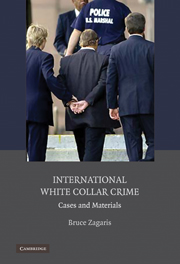Book contents
- Frontmatter
- Contents
- 1 Introduction
- 2 Taxation
- 3 Money Laundering and Counterterrorism Financial Enforcement
- 4 Transnational Corruption
- 5 Transnational Organized Crime
- 6 Export Control and Economic Sanctions
- 7 Extraterritorial Jurisdiction
- 8 International Evidence Gathering
- 9 Extradition and Alternatives
- 10 International Prisoner Transfer
- 11 The United Nations
- 12 The World Bank Group
- 13 INTERPOL
- 14 Economic Integration and Business Crimes
- Index
- References
9 - Extradition and Alternatives
Published online by Cambridge University Press: 05 June 2012
- Frontmatter
- Contents
- 1 Introduction
- 2 Taxation
- 3 Money Laundering and Counterterrorism Financial Enforcement
- 4 Transnational Corruption
- 5 Transnational Organized Crime
- 6 Export Control and Economic Sanctions
- 7 Extraterritorial Jurisdiction
- 8 International Evidence Gathering
- 9 Extradition and Alternatives
- 10 International Prisoner Transfer
- 11 The United Nations
- 12 The World Bank Group
- 13 INTERPOL
- 14 Economic Integration and Business Crimes
- Index
- References
Summary
Introduction
When suspects flee a country to avoid prosecution, that country's authorities must gain custody of them before they can be tried and convicted. The most common way to gain custody is through extradition, whereby one state – the requested state – transfers custody of a fugitive or accused person, known as the relator, to another state – the requesting state – for criminal prosecution. During the process the relator can choose to return voluntarily, waiving extradition. States can also gain custody over a relator through legal tools like exclusion and deportation or through abduction by fraud (“luring”) or by force.
The number of extradition cases has risen dramatically over the past fifty years, both in the United States and abroad. According to the Department of State, U.S. courts certified 137 extradition requests between 1945 and 1960 – an average of only 9 per year. In 1995, in contrast, the United States extradited 79 people to other countries and received custody of 131.
Several factors discussed throughout this book have contributed to this enormous increase, including globalization, the expansion of free trade, and broadened access to international communication and travel. Many states, including the United States, have concluded extradition treaties and related enforcement mechanisms and devoted increasing resources to investigating and prosecuting transnational crime.
- Type
- Chapter
- Information
- International White Collar CrimeCases and Materials, pp. 301 - 364Publisher: Cambridge University PressPrint publication year: 2010



